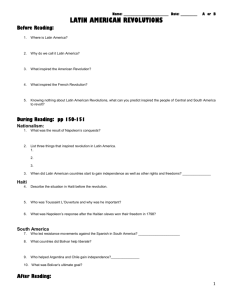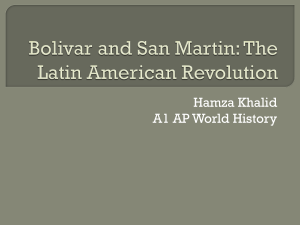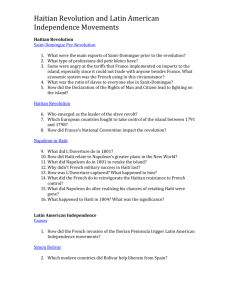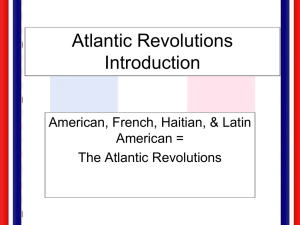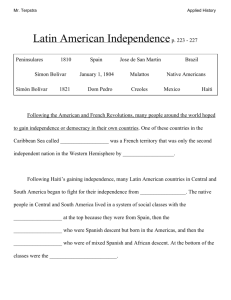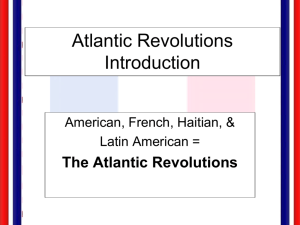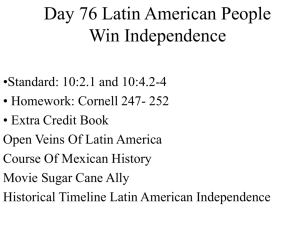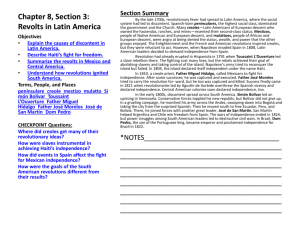UNIT FOUR: REVOLUTIONS IN EUROPE AND LATIN AMERICA
advertisement
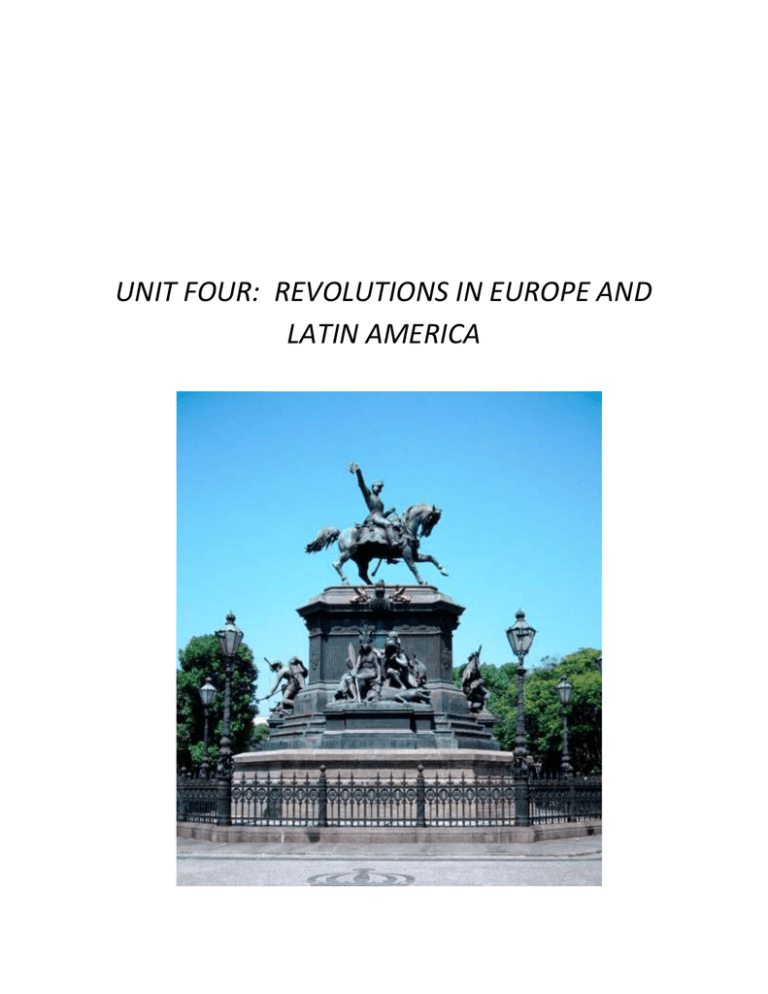
UNIT FOUR: REVOLUTIONS IN EUROPE AND LATIN AMERICA Unit 4: Revolutions in Europe and Latin America (Chapter 21 and Chapter 24 Section 3 in the textbook) Terms: Define the following as they pertain to the historical topic at hand. Term Define (what does it mean) Importance (what effect does this have on history?) Universal manhood suffrage Autonomy Not necessary do not answer Ultra-royalists “Citizen King” “February Days” “June Days” El Grito de Dolores Gran Colombia Hierarchy Not Necessary do not answer Second Empire Third Republic Dreyfus Affair The Siege of Paris Spanish Social Hierarchy: Identify each class, who would belong, and what kind of influence they had in the new world social order: People: Identify the following individuals Individual(s) Prince Clemens von Metternich Milos Obrenovic Louis XVIII Charles X Louis Philippe/ Napoleon III Louis Kossuth Simon Bolivar Toussaint L’Ouverture Father Miguel Hidalgo Jose Morelos Tupac Amaru Jose de San Martín Location Significance/ importance to history Dom Pedro Map Activity: Place the kingdoms/places listed below on the map. Create a color key to demonstrate the coordination. A) Europe France Belgium Austria Greece Serbia Germany Italy B) B) Latin America Mexico Argentina Chile Peru Haiti “Gran Colombia”: Ecuador, Colombia, Venezuela Charts: Complete the chart using information from class as well as your textbook. A) Causes and Effects of Latin American Independence Movements Short Term Causes Long Term Causes Short Term Effects Long Term Effects Primary Sources: Use the documents to answer the following questions. Use complete sentences. Source: PROCLAMATION OF HAITI'S INDEPENDENCE BY THE GENERAL IN CHIEF, Jean Jacques Dessalines to the Haitian people in Gonaives, on January 1st 1804, year first of Haiti's independence Dear Citizens, It is not enough to have expelled from your country the barbarians who have bloodied it for two centuries; it is not enough to have put a brake to these ever reviving factions which take turns to playact this liberty, like ghost that France had exposed before your eyes; it is necessary, by a last act of national authority, assure forever an empire of liberty in this country our birth place; we must take away from this inhumane government, which held for so long our spirits in the most humiliating torpor (lifelessness), all hope to resubjugate (enslave) us; we must at last live independent or die. Let us be on guard however so that the spirit of proselytism does not destroy our work; let our neighbors breathe in peace, may they live in peace under the empire of the laws that they have legislated themselves, and let us not go, like spark fire revolutionaries, erecting ourselves as legislators of the Caribbean, to make good of our glory by troubling the peace of neighboring islands: they have never, like the one that we live in, been soaked of the innocent blood of their inhabitants; they have no vengeance to exercise against the authority that protects them. Let us swear to the entire universe, to posterity, to ourselves, to renounce forever to France, and to die rather than to live under its domination. To fight until the last crotchet rest for the independence of our country! 1) According to Dessalines, how does France treat the Haitian people? 2) How does the Haitian experience differ from those of their neighbors? 3) What is the ultimate goal for the Haitian people? Source: The following selections come from a proclamation by Simon Bolivar, calling Venezuelans to arms in the fight against Spanish occupation, which occurred in 1813. THE 1813 PROCLAMATION We are sent to destroy the Spaniards, to protect the Americans, and to re-establish the republican governments that once formed the Confederation of Venezuela. The states defended by our arms are again governed by their former constitutions and tribunals, in full enjoyment of their liberty and independence, for our mission is designed only to break the chains of servitude which still shackle some of our towns, and not to impose laws or exercise acts of dominion to which the rules of war might entitle us. Moved by your misfortunes, we have been unable to observe with indifference the afflictions you were forced to experience by the barbarous Spaniards, who have ravished you, plundered you, and brought you death and destruction. They have violated the sacred rights of nations. They have broken the most solemn agreements and treaties. In fact, they have committed every manner of crime, reducing the Republic of Venezuela to the most frightful desolation. Justice therefore demands vengeance, and necessity compels us to exact it. Let the monsters who infest Colombian soil, who have drenched it in blood, be cast out forever; may their punishment be equal to the enormity of their perfidy, so that we may eradicate the stain of our ignominy and demonstrate to the nations of the world that the sons of America cannot be offended with impunity. 1) Name at least 3 offenses committed by the Spaniards against the Americas. Summary Questions: Answer the following questions in 3+ full sentences 1) Compare the causes of the French Revolution and the revolutions in Latin America. What are the similarities/differences? 2) How is Brazil’s revolution different from the others? How does this impact the government that is set up after independence? 3) Describe the conditions in the newly independent Latin American countries and Haiti. Are they better off under colonization? Why or why not? Explain your answer.
